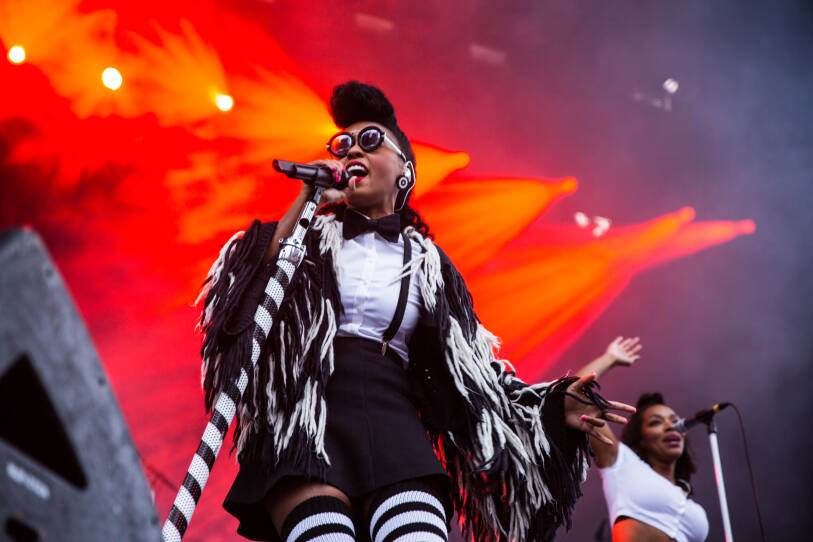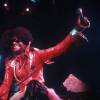To the relief of all involved, it was overcast and cooler on day three of Boston Calling. Not for nothing, but broiling in the hot sun probably made us all a little cranky Saturday.
We got off to an auspicious start with Boston MC Michael Christmas getting the entire, sparse crowd bouncing from the opening strains. With a full crew of hype men backing him, Christmas worked his fans and worked the stage, waking Government Center with a roaring set. Christmas waited until the end of his set to tease his most well-known tune, an ode to Michael Cera, that provided a transition to the even more playful Christine and the Queens.
Heloïse Letissier, known better as Christine and the Queens, built on the energy of Christmas’s set by mischievously strutting in her best Michael Jackson mode on her opener, “iT.” Teasing the audience with some suggestive gestures, Christine elicited some embarrassed leers to start the set, but quickly won any leery onlookers over with a seductive, seasoned, and tongue-in-cheek stage presence.

Christine playfully bantered with the audience, taunting us as to whether or not we really wanted to know this “#angryfrenchgirl.” Of course, we did. We didn’t really believe she was that angry, seeing as she delivered a joyous performance replete with a well-choreographed dance troupe and a tight three piece band over electronic beats. Her wide-ranging references to pop music past — from Beyonce to C&C Music Factory — continued throughout the set with Christine easing her audience to more sensitive messages.
Filling the first slot of the day on the jetBlue stage, Christine and the Queens picked up where Lizzo left off Saturday, hosting an affirming party for all who witnessed. Lizzo took on body positivity, and Christine and the Queens took on gender fluid identities, offering a witty and moving tribute to diversity with some flowers she had on stage, and concluding, “I feel like a little boy.” We all felt a bit lighter, a bit easier, and a bit more comfortable in our own skin after Christine and the Queens finished one of the best one-two openers in Boston Calling memory with Michael Christmas.
We had some time with Christine and the Queens in the media tent after her performance, where we talked about her performance and feeling like a little boy.
The Unknown Mortal Orchestra took the stage with a psych-jam set that had a peculiar characteristic to it. Guitarist and leader Ruban Nielson treaded a line between noodling and more responsive improvisation, and the rest of the band followed suit, slipping in and out of dialogic jams. It was tough to follow the energy of the first two sets, and for those who needed a calmer come down, Unknown Mortal Orchestra was perfect. For those who were looking to maintain their buzz — musical or otherwise — there were substitutes.
A general media buzz preceded Vince Staples to the stage, and while he gave the fest a dose of energy, he would later bring some unease as well. Common to his flow and stage presence, Staples balanced heavy themes and and urgent flow with a playful stage banter and practiced showmanship, knowing, in particular, how to use his energy and presence to work the crowd. From bounding across the stage with vigor, to drawing out a sharp flow while standing stock-still, or even sitting, Staples intensified the performance to the point of attempting to engage the crowd in a “f–k the police” chant, but backed away when the crowd just did not respond as he thought they would.
Nonetheless, Staples regained the audience with stock gestures and standard festival fare — starting each track with some variation of “jump! jump! jump!”, for instance — to bring out the party and let down his guard. In the end, Staples won over the public and gave us that shot to take us to Charles Bradley.
Over on the local stage, These Wild Plains brought some of the only country sounds to Boston Calling, sounding at first like, “a bar band that just cross the street from Faneuil Hall, but better” according to FRB contributor Jason Turesky.
Singing about heartbreak, the devil and moonshine, the band brought a few themes we don’t hear too often in New England. But the crowd stomped and cheered, especially as they brought out a few anthems to close the set. Selling out their CDs in front of the stage, singer Ben Voskeritchian did echo a more familiar New England sentiment. “We’re gonna need more CDs,” he said.
Charles Bradley is the new king of soul. And we say that not only because the man favors James Brown so much that his moves and voice can be indistinguishable at times. We say that because as the plaza cooled down, and the crowd went from t-shirts and shorts to sweatshirts and jeans, Charles Bradley still moved feet and warmed seats, with a few hundred fans shaking moneymakers in front of the stage. When Bradley slowed things down at the end of his set with an irresistible and heartfelt take on the Black Sabbath ballad “Changes,” the deliberate pull and sway of the audience rocking on the downbeat seemed to have the whole of the city bobbing. Earlier this week, Boston Calling co-founder Brian Appel told us Charles Bradley was a target on the bill because he could command audiences. There was no greater evidence of that than today.
Few bands could have followed Bradley’s owning of the audience, but the Front Bottoms blazed out of the gate and rocked the growing crowd on the plaza. Earlier this week FRB contributor Karen Muller described the Front Bottoms as “that sweet spot right before a party gets out of hand: everything’s just a little bit out of control, but everyone feels better for it.” She couldn’t have been more spot on. The crowd rollicked and sang along, in a boozy wobble. Perhaps without even knowing the words.
We’ve been busy handing out unofficial awards from time-to-time this weekend, and we’re calling the Front Bottoms the festival’s best friends. The obliging quartet from New Jersey gave us an affable set, reminding us that getting a little buzzed, and a-rocking and a-reeling is what this crowd should be doing.

Elle King thought she was doing what the Front Bottoms did — playing the good time Jane for the day-long party — but she came off as the drunk aunt who just won’t put the karaoke mic down. She slunk into her set with a low-energy drawl and a piercing baby doll whine. Her unremarkable performance drew heavily on a disingenuous country ethos that grated after a while, and odes to Johnny Cash and the Beatles smacked of low-grade karaoke, despite the bad girl prefaces she hoped granted some authenticity. “Hopefully, I won’t remember being here,” she told the audience toward the end of her set. “I’m joking, I’m joking.” Honestly, Elle, it wouldn’t matter much to us. We’ll probably forget you were here in a few days.
Booked for a half hour on the local stage, local fuzz punks Black Beach ripped through their set in seventeen minutes. The high energy trio assaulted an appreciative audience with sonic bombast, howled vocals, and lightning guitar solos. How to fill out the last thirteen minutes? How about a few requests from friends, a passing (sarcastic?) thanks to Marty Walsh, and then home for dinner? We give them credit for the efficiency and for being the only band with the wherewithal and gumption to knock the mayor on his home turf.
Let’s dispense with the obvious on Janelle Monáe’s time at Boston Calling. It was likely the best set of the weekend. It was likely the most important set of the weekend. And should she ever come back to Boston Calling, she’d better be a headliner.
The best set of the weekend? Monáe ratcheted some drama being wheeled to the stage, à la Hannibal Lecter, to the fanfare of Straus’s Also sprach Zarathustra. When she took on James Brown’s “I Got You (I Feel Good)” — a staple of her set lists — a few songs into the performance she fulfilled on the promise of Charles Bradley’s earlier set, delivering this crowd to a soul delight. The stark image cut by the band, clad all in white against the black backdrop, placed Monáe in relief, so that every gesticulation popped for the crowd.

The most important set of the weekend? In the midst of a boisterous, eclectic performance swinging from jazz to soul to hip hop and back, Monáe paused between songs to appeal for equal pay for women. As with Lizzo and Christine and the Queens, Monáe used her space and influence to appeal for social justice, and got over quickly on the audience before moving right on back to blowing the figurative roof off of city hall.
The would-be headliner? With top voice and tight band, Monáe tore through her catalog, though the set was highlighted by three covers: the aforementioned “I Feel Good,” the Jackson 5’s “I Want You Back,” and a tribute to Prince with “Let’s Go Crazy.” Calling Prince her hero, her mentor, and the most important rock star, she launched into a raucous but controlled take on his classic to close her set. Earlier this week, we made the call that she’d spring with her track “Come Alive (War of the Roses),” to close. She didn’t, but it was ok. In fact, this was better. Better than we could have imagined at mixtape time.
It was a programming gamble to follow Janelle Monáe with Haim. Even if we knew Janelle Monáe was good, not many knew she’d shut it out. We’ll go on record with Haim’s set as one of the tightest and brightest of the weekend, and yet somehow after Janelle it was a bit of a come down. It’s no knock on Haim; they started strong with “If I Could Change Your Mind,” replete with Danielle Haim channeling Lindsey Buckingham circa Rumours on a roaring solo. And the band was tight, and slick, and smooth, and chock full of everything we’ve come to love from Haim.

Haim’s own tribute to Prince was still a festival highlight, as Christine and the Queens picked up the dancing duties behind the sisters on “I Would Die 4 U,” a track well-suited to Haim’s aesthetic. It wasn’t much of a surprise, though, as they’ve trotted it out quite a bit on their current tour. And they’ve also trotted out new music from their coming album on the current tour, as they did tonight. If anything, Haim marked themselves as a band to catch on their inevitable arena date the next time they work their way through town to support that new album. We’re thinking six months to a year from now in Agganis? We’ll see you there.
Disclosure’s set kicked off amidst a flurry of rumors that Sam Smith would be joining the electronic duo at some point in their set. It was a reasonable rumor, given Smith’s successful collaborations with the brothers Lawrence, and the fact that Smith was spotted in New England as recently as last week. Alas, there was no Sam Smith and a few audience members near some of the Front Row team could be heard grumbling about it. That unfortunate expectation distracted from an otherwise solid set that brought even LPizzle on board.
Performing live on bass and sample pads, Disclosure brought an organic sensibility to their dance music. Parsing electronic subgenres can be a fool’s errand, but the band drew an earthy house sensibility with a round, and filtered bass. Layer that with stuttered rhythms instead of the abiding backbeat so often heard in house, and the rest is an integrated hybrid and eclectic, broad-based dance pop. (Or simply UK Garage, as our contributor George Greenstreet told us on Thursday).
With the set opening on the well-known “White Noise,” the band used their light show to an illuminating and effervescent effect, closing the massive plaza into a gleaming intimate space for the crowd. Following that, and unlike the previous night’s dance artists — particularly Robyn — the band clearly demarcated songs, instead of playing a continuous groove. This was no DJ’s set, but was clearly a pop festival headliner’s set. Disclosure evinced their familiarity with the festival vibe, playing off the audience as listeners more than as dancers.
But of course there was dancing. There was much dancing. A few songs into the set, Disclosure took on “Superego,” a highlight of their latest Caracal. The round filtered bass blossomed to a more subtle groove than many of the other tunes of the night, and it urged the waving glowsticks across the plaza to sway and twirl as well as any dance floor banger.
By the time Disclosure did bring out a guest during their encore, the audience anticipated Sam Smith. We got Brendan Reilly, the featured vocalist on Disclosure’s “Moving Mountains.” Reilly’s performance was faultless, but he was not Sam Smith, and he bore the brunt of a crowd largely nonplussed with his appearance. Short of Sam Smith stepping on stage, the only thing that could’ve pleased the closing audience at Boston Calling was another dose of Janelle Monáe.
The announcement earlier this weekend that Boston Calling would be moving from Government Center to Allston next year also brought news that the festival will become an annual event. The fall Boston Calling is no more. Though it’s twelve months from now, we’ll be looking at a bigger, bolder version of this rite of late spring next time around.
Moving the festival loses so much of the emblematic nature of the city hall backdrop. After all, the festival has become such a demonstration of civic pride that the manicured fields of Harvard feels like a challenge to the fundamental identity of the Boston Calling. There’s a certain pity in that. It’s a bummer. But when next May rolls around, we still plan on being there.





